For the last month, we have been visited by a pair of Great Spotted Woodpeckers, the male is larger with a black cap and crimson red rectangle on his nape, the female is smaller with black cap extending to the nape. To tell them apart look at the back of their heads as he has a distinctive red rectangle and she does not. They do not appear at the same time but the odds they are a couple are high. On balance we seem to see the skittish female slightly more than the male. They have been tricky to photograph but a couple of weeks ago, I came home to find the male clinging to one of our peanut feeders.
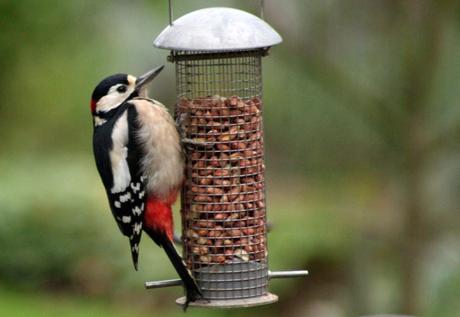
Male Great Spotted Woodpecker (Dendrocopos major)
We live in a house with very large picture windows, so whilst we can see out easily, birds can spot if I am moving towards a window with a camera too, so Pink Panther style I crawled along the floor, holding my breath and camera and slowly slid up a wall. He was still there, still seemingly hanging on. I could not believe he was happy to pose and began to take photographs.
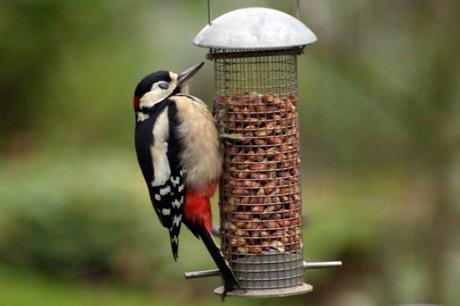
Male Woodpecker with nictitating membrane across eye
When I looked later at my photos I could see he had closed the nictitating membrane across his eye briefly. I’ve since read this is to both protect the eye from flying debris when they are chiselling wood and to clean the eye surface in much the same way we do when blinking. The longer I stood taking photographs with only a slight breeze moving the peanut feeder I began to worry his claws were entangled in the wire and he was frozen with fear. I thought through the process of trying to keep the bird calm whilst I unhooked him from the feeder.
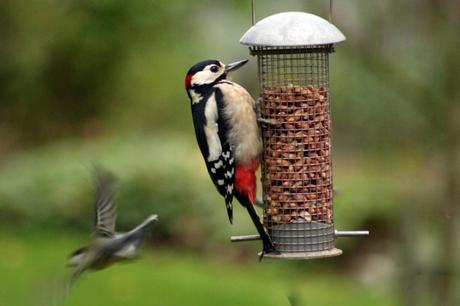
Great Spotted Woodpecker with passing Coal Tit
Other birds flew by, he ignored them and just as I was finally bracing myself to help this beautiful bird, he flew off. I looked at the time line on my camera, he had hung there for just over 10 minutes, completely still. I then looked his behavior up and my RSPB Handbook of British birds reports that Great Spotted Woodpeckers ‘freeze’ when danger threatens usually on the side facing away from danger. Does he not know how gorgeous and striking he is, that the flashes of red are most alluring?
The female of the species was much harder to photograph. Annoyingly, we also a have a large Magpie in our garden that dive bombs the Woodpeckers. I think his/her behavior may be protective as like Magpies, Woodpeckers can eat other birds eggs and chicks and although any Magpie eggs should now be hatched, fledged and on their way to adulthood, the Magpie probably had a bad experience. However, a few days after the male had been so obliging I was delighted to be able to slide along the floor again, up the dining room wall and peek out from behind the curtains to see the female Great Spotted Woodpecker engrossed with peanuts.
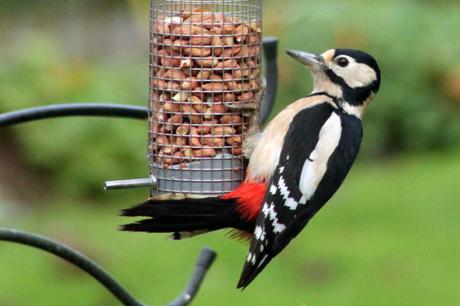
Female Great Spotted Woodpecker
The RSPB report they are the size of a Blackbird, the male seems larger, maybe its his puffed out chest. We occasionally see a pair of Green Woodpeckers looking for ants in our lawn but this is the first time we’ve been regularly visited by a two Great Spotted. Primarily living in woodland they use their powerful beaks to bore into trees and their long tongues to find the adults and larvae of wood boring beetles. Both the males and females also use their beaks to create nesting cavities within tree trunks and branches of mainly Birch and Oak. The repetitive knocking on wood sound is distinctive and joyful, one of the easiest birds to recognize by ear.
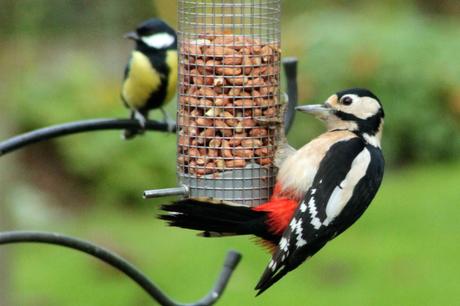
Female Great Spotted Woodpecker and Male Great Tit
Great Spotted are one of 3 UK Woodpecker Species, Green, Great and Lesser. The Great Spotted are a success story, with numbers rising rapidly since the 1970’s and again in the 1990’s according to the BTO. A new colonization of Ireland was recorded in 2008, where previously there have been no Woodpeckers. The BTO estimates 140,000 breeding pairs in the UK. I continued to watch the female Woodpecker who in turn was watching the Male Great Tit.
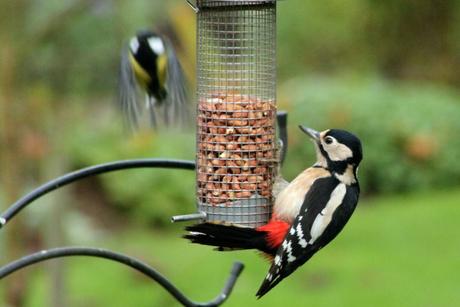
Female Great Spotted Woodpecker observing a departing male Great Tit
Then as the Great Tit jet packed off, I shifted slightly and she flew off too. We feel very fortunate to see these Woodpeckers visiting every couple of days, along with all of the usual suspects – Chaffinchs, Great Tits, Coal Tits, Blue Tits, Dunnocks, Sparrows, Blackbirds, Wrens, Wood Pidgeons, Jackdaws, a pair of Robins that so far I haven’t caught on camera but will keep trying. Pheasants, Long-tailed-Tits, occasional Goldfinches and the squabbling Starlings are all back too. But this month our honoured guests are having Wildlife Wednesday all to themselves.
My ever grateful thanks to Tina who writes the eye opening My Gardener Says blog for hosting this meme and for providing the opportunity to both share and to learn about other folks wildlife.
Happy Wildlife Watching!
